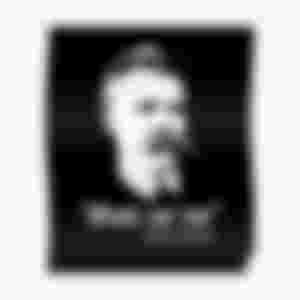
The industrial revolution in England and France gave rise to a new human perspective on God, the world, man himself and everything related to himself. Philosophy also comes new. Descartes preceded it with his cogito ergo sum which later gave rise to modern philosophy. After Descartes, another prophet appeared in the world of philosophy who predicted the collapse of Christian hegemony in Europe. He was Friedrich Wilhelm Nietzsche.
Friedrich Wilhelm Nietzsche became the main figure in the emergence of reforms from modern philosophy to post-modern philosophy. Its contribution to the world of philosophy is beyond doubt. Perhaps no philosopher is more famous than Nietzsche. His radical and controversial thoughts have become an endless hot conversation.
One of his thoughts that changed the perspective of philosophical thinkers was that the concept of God was dead. This thinking is a new thing because it breaks the old concept which is dominated by Christian thinking. Experts call Nietzsche a nihilist. Like other nihilists, Nietzsche was of the view that it was necessary to have a total "ruin" for an improvement.
Nietzsche the God-Slayer
Nietzsche is a unique philosopher who thinks uniquely and expresses it uniquely. His uniqueness is what makes him so special to the world of philosophy. His thoughts can never be separated from the background of his life. In fact, without hesitation, he tells a lot about his life in his writing. Besides, the way of conveying his philosophy using literary techniques is something new in the world of philosophy which has always used objectivity and language standardization as the main things.
For Nietzsche, plural truth can only be conveyed through literature. This means that the interpretation of truth will always be plural and never singular. Nietzsche thoughts on God's death are found in some of his works. One of his famous writings on this subject is in his book, "the gay science".
It is very important to mention here Nietzsche basic thinking about God. Nietzsche understands God like a dream. When we sleep and dream, it is as if we are in a real-world which turns out to be just a dream. Such is the case with God. Humans are unable to distinguish between actual reality and reality which is only a shadow. If we try to interpret it, Nietzsche considers God only a projection of human limitations who yearn for unlimited power.
The Meaning of God's Death
God is dead, the famous Nietzsche put it. Given the concept of "dying" in God, Nietzsche wanted to say that God's existence depends on synthetics. God becomes an argument that can be accounted for only in terms of time, being, history, and humans. Therefore, Nietzsche gave the concept of death in his argument about God.
With the death of God, Nietzsche then proposed the concept of the birth of a new God. When God dies, man becomes God. Jesus was the sacrifice who had to die on the cross. Death was later disguised as a pious belief in God's love. God sacrificed Jesus to be free from Himself and the Jews. God needed to kill His Son to be free from Himself and be reborn as a new universal God. That is the meaning of God's first death.
Second, Jewish consciousness wants a more universal God. With the Lord's death on the cross, God was no longer Jewish. Jews prefer to create a God who is loving and willing to suffer because of hatred. With a more universal value of love, the Jewish God has become a universal God. The old God died and the Son created a new God for us who is full of love.
The third meaning of God's death has to do with Christianity. Nietzsche defines another theology of St. Paul. Paul's theology on which many Christian teachings are based is a massive forgery. It is said that because the death of the Son was to pay God's debt. Nietzsche saw His debt too great. But then, God sacrificed His Son no longer to free Himself but for the sake of mankind. God sent His Son to die for love, we respond with feelings of guilt, guilt for the death and redeem it by blaming ourselves. So then Nietzsche called us all murderers of God with all our sinfulness.
This is the slave morality that Nietzsche criticized. The slave acts not on his grounds but the basis of fear of his master. His actions were always based on the orders of his master. Acting alone would deny one's nature and be considered a mistake. Unlike slave morality, master morality is the opposite. Master morality does not manifest what should be done but what is done. Lord morality respects itself. They are always sure, their actions are good.
Ubermensch and the Lord-Slave Morality
In the absence of God's presence in our lives. Nietzsche wants us to live not as slaves who fear their master but become masters themselves. For perfection, Nietzsche uses the term Ubermensch. Ubermensch here is not meant to be the same as superman which connotes stagnant but uses the term overman, which is continuous and in the process of becoming. Ubermensch is a term found in the book Also Sprach Zarathustra.
Ubermensch is a superior human being more than any other human being. For Nietzsche, a good culture is a culture that makes human beings progress and becomes superior. Whereas a culture that advocates a durschnittlich (middle/average) will only remove individual talents and turn them into a herd. The flock is the crowd. They are a means to an end not an end in itself. Humans are the means to reach Ubermensch. Changes to Ubermensch must be preceded by a critical human attitude and carry out a transvaluation, overturning the existing values until finally, the human being can determine his values. Ubermensch has always recognized himself as der Wille-zur-Macht and did not cover it up.
Will in power
Ubermensch is always connected with a purpose. The will to power is the essence of everything, including in knowledge. Not only Ubermensch but all humans. But Ubermensch's goal never refers to anything other than itself. The will to power must decisively surpass humans. This thinking is a way for Nietzsche to get rid of morality and replace it with the Ubermensch concept in which man always acts purely of himself.
At first glance, it seems that Ubermensch is a selfish human who ignores other humans. But Nietzsche disagrees. According to Nietzsche, Ubermensch has never dominated one another or sacrificed another biologically or politically. Nietzsche called the false desire for power a "demon for power" or "a fanatical desire for power."
Nietzsche stressed understanding of the will to power is more of a quality of will. It is an existential depth for self-transcendence. Humans must make every effort to achieve their goals. And that doesn't use instinct but with complete self-control.
Criticism of Nietzsche
Nietzsche philosophy is inseparable from the circumstances of his time. Nietzsche hatred for religion emerged after seeing the fact that religion at that time was only as our escape from problems that existed in the real world. It can be seen here that Nietzsche ignores other aspects and is unbalanced in understanding true religion. Hatred had too much effect on his theory.
The God Nietzsche "killed" was more like a psychological God. He did not touch God's existence at all. He only saw God from the human concept without being able to break through the limits of God's transcendence. This is understandable because Nietzsche has violated the limits of his scientific discipline. He did not distinguish between a psychological God and a philosophical God.
Nietzsche Ubermensch appears to be utopian because he admits that no human can be considered an Ubermensch. He was also too radical to say that Ubermensch could exist if humans first transvalued existing values to get their value. He ignores the human aspect of his relationships with others. Values that are lived personally can be disastrous for mankind because there is no single rule that is carried out as an agreement. Moreover, according to Nietzsche, the nature of truth is plural.
Ubermensch, who Nietzsche said, is a superior human who always strives for a value that is integrated into himself. This understanding does not mean we have to oppose every existing rule, but how we can live up to the values that exist around us. It is not easy, lest we get caught up in hypocrisy. Ubermensch has always gone to great lengths to develop itself not only for the satisfaction of the formators but for the greater cause for which we strive. Nietzsche criticism can be an input for us and our faith. This article will conclude with a phrase from Nietzsche. "Making people nervous, that's my job."

Yes,I Understand